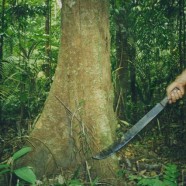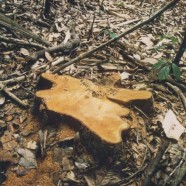Specious Woods
Press Release Modern Express no. 4
(The other press releases on the modern Express are available here)
According to the French naval headquarters of the Atlantic Ocean there are 3600 tons of sawn timber on board of the Modern Express. On the other hand, the Ministry of Economy of Gabon (after having consulted with the shipping agent Necotrans in Libreville) claims that there are 4089 tons of sawn timber. Necotrans also has an agency in Le Havre.
The fact that Gabon claimed an international investigation of the matter thorough Interpol encourages France to do likewise on its own territory, particularly because the timber unloaded at Le Havre can reach China on board of container ships of Chinese companies that regularly call at Le Havre.
The Convention on International Trade in Endangered Species of Wild Fauna and Flora about to be reborn as the WTO (World Trade Organization)
The 15th conference of the parties of CITES has just ended in Doha. The porbeagle shark was put back on the table following the intervention of Singapore, which believed that there had been technical problems with the first vote. The debates were evaded by a procedural trick and the proposal passed directly to vote. The proposal was rejected by three votes. Iceland, candidate to join the European Union, and Japan, which will host the Conference for Biodiversity next October, in showing the best intentions in the world, warmly hugged each other in the middle of the conference room to congratulate themselves on this failure of Europe and the protectors of sharks.
Madagascar, Dynastes satanas, spiny tailed lizard, Kaiser’s spotted newt, coral
News in brief:
Bluefin tuna: The International Commission for the Conservation of Atlantic Tunas is not opposed to the listing of bluefin tuna in Appendix 2, and Australia has declared itself favorable to the idea; more to follow…
The fragrance of rosewood floats over CITES
This morning, the 15th Conference of States at CITES decided by consensus to approve the Brazilian proposal to list Brazilian rosewood (Aniba rosaeodora) in Appendix 2. The international trade in rosewood essential oil will be controlled from now in importing and exporting countries. The listing makes a provision for the exclusion of finished products, packaged and ready for sale. Ladies, you do not need a CITES permit to travel with your No5.
Brazilian rosewood is also called pau rosa, its Brazilian name, to avoid confusion with other species from around the world which are also named rosewood because of their color. Pau rosa is exclusively present in the Amazon basin, principally in Brazil and French Guiana. Some populations were counted in Colombia, Peru, Ecuador, Guyana, Suriname, and Venezuela. As the Brazilian proposal emphasizes, the growth of this tree is slow while its exploitation is rapid. The harvesting surpasses its capacities for natural re-growth. All the countries in the region supported Brazil, as well as Mexico and Costa Rica on behalf of 25 Central American and Caribbean countries. Those which were against it didn’t so much as lift a finger.
Rosewood tree, African elephant, polar bear and Mariana mallard
The 15th meeting of the Conference of the Parties of CITES, Convention on International Trade in Endangered Species of Wild Fauna and Flora will take place in Doha, Qatar, from the 13th to 25th of March 2010. As with every precedent session since 1989, Robin des Bois will attend.
Brazilian rosewood, rosewood tree (Aniba rosaeodora Ducke):
Chanel uses Brazilian rosewood an essential oil in their perfume n°5, in 1997 a controversy arose around this subject between the perfumery and Robin des Bois. This controversy was closed by a mutual accord on the necessity to protect Brazilian rosewood, notably via controlling international trade, by including the species on Appendix II of CITES and with plantation trials in French Guiana. Currently, essential oils of rosewood are on the market, for the most part they are made out of chemical substances but they could contain traces of the natural essence. The market of “organic farming” certificated oils used in aromatherapy claims Brazilian rosewood to have anti-depressing and aphrodisiac properties. The principal range state Brazil is proposing the inclusion of Brazilian rosewood in Appendix II. All of the French perfumeries are in favour of this proposal. More than 10 years after the start of Robin des Bois’ campaign, the time it takes for diplomacy, this proposal is an important issue for the Robin des Bois association. The battle is far from over as the Parties who profit from the wood industry are generally reluctant about including a tree in appendixes I or II. Concerning this species, clairvoyance by the Brazilians should be acknowledged.













